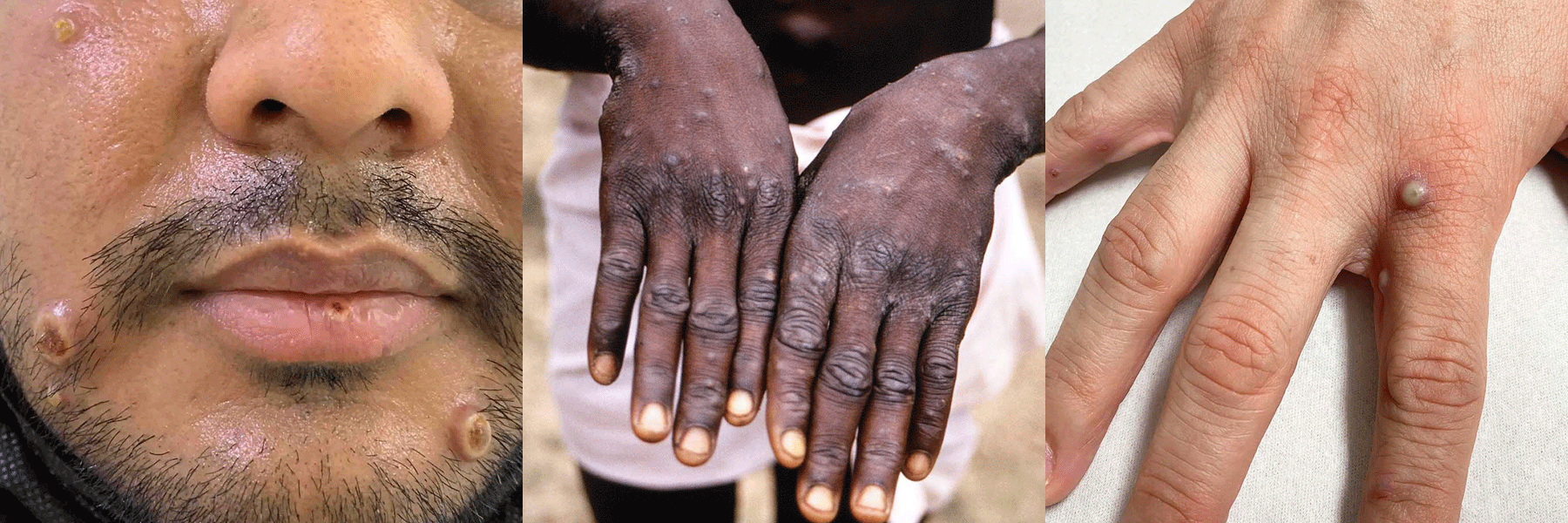About mpox (previously known as monkeypox)
Mpox (previously known as monkeypox) is a viral infection similar to smallpox and cowpox. In fact if you have ever been given the smallpox vaccine, you may have protection from mpox. Mpox is a rare infection most commonly found in parts of central and east Africa. The risk of catching it in the UK is low for most people.
Mpox is typically transmitted through close, often intimate physical contact with a symptomatic person and through shared use of their clothing, bedding and towels. It is currently thought unlikely that the virus spreads through airborne transmission, but it is possible that respiratory droplets may carry the virus.
The signs of mpox are typically very visible, and include rashes, scabs, blisters and lesions. Other symptoms of mpox include a high temperature (fever), headache, muscle aches, backache, swollen glands, shivering (chills), exhaustion and joint pain. Mpox does not spread easily between asymptomatic people. In simple terms, if someone does not have any of the symptoms listed above, they are unlikely to spread the virus.
New concerns
Whilst it is important to remember that the risk to the UK population from mpox continues to remain low, a recent case in the Northeast of England during March has caused concern because the individual had no reported travel history or links to previously confirmed cases. In this incident all contacts have now been followed up and no further cases identified. The UK Health Security Agency (UKHSA) mpox incident director Dr Gillian Armstrong was quoted this week as saying, “The majority of people who have presented with symptoms report close physical contact, including massages, or sex prior to developing symptoms”.
Advice for Therapists
Because so many therapies involve touch and close contact - not just massage – it is important that we all remain alert to the risks. However:
- The risk to the UK population from mpox is considered low
- The mpox infection is mild for many and there have been no reported UK deaths
- Although not currently offered to all, an mpox vaccination is available
- Both variants of mpox (Clade la and lb) are no longer classified as a high consequence infections disease (HCID)
- Mpox does not appear to easily spread in asymptomatic people. If a client has undiagnosed symptoms such as rashes scabs, blisters and lesions, swollen lymph nodes, fever, headache and muscle and back pains, then they should postpone their treatment under any circumstances, regardless of mpox.
As the mpox virus may be spread by respiratory droplets, and contaminated clothing, bedding and towels, it is important to maintain excellent standards of cleanliness and hygiene throughout your practise. If you are particularly concerned, we recommend that you use disposable gloves for your treatments where possible. You may also consider adding a question such as “Do you have any new undiagnosed blisters or spots” to your pre-treatment consultation form. Remember, treatment is always at your discretion. If for any reason you are not comfortable, we would suggest that you refuse or postpone treatment.
The NHS website advises that mpox is usually a mild infection and can get better within a few weeks without treatment. Because the infection can be passed on through close contact, it is important to isolate if directed to do so. If symptoms are more severe and a person becomes unwell, they may need hospital treatment. Once the mpox rash has fully healed and the blisters have scabbed and the scabs have fallen off, there is believed to be no further risk of contagion. This can take several weeks.
Images from nhs.uk/conditions/mpox

The FHT will continue to monitor the threat of mpox and update this article accordingly.
Useful Links:
NHS Find an mpox vaccination site
NHS Guidance for people who are isolating at home
UKHSA Latest update on Clade lb mpox